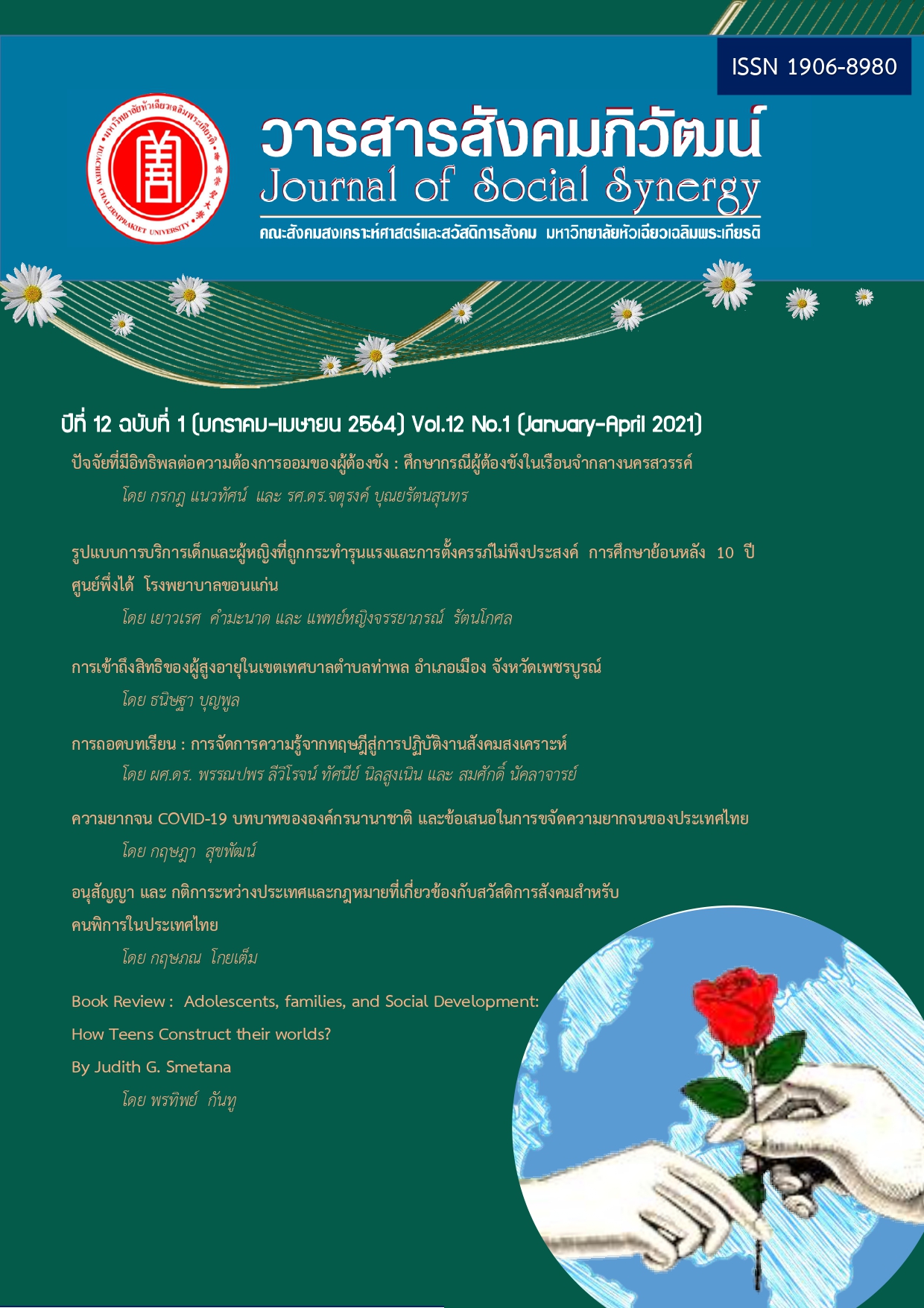Factors Influencing Saving Need of Prisoners : A case study of Prisoners in Nakhon Sawan Central Prison
Keywords:
Prisoners, Saving Need, Factors Influencing Saving NeedAbstract
The objectives of this quantitative research were 1) to study basic information, background, and status of prisoners, 2) to study policies and measures to promote savings, 3) to study the level of savings demand of prisoners, 4) to study factors influencing the savings demand of prisoners, and 5) to provide recommendations for improvement and development of the "Saving for New Life Project" and "National Savings Fund Project (NSF)". The sample consisted of 258 prisoners in Nakhon Sawan Central Prison who participated in the “Saving for New Life Project” or “National Savings Fund Project (NSF)”.
The findings of this study indicated that 1) The majority of the sample were male, secondary education level, single status, having children, Buddhism, without any income from themselves, income from the family which was 3,001 baht or more, punished more than 3 - 5 years, and had a drug-related offense. 2) Prisoners agreed on policies and measures, criteria, and procedures for participating in the Saving for New Life Project, National Savings Fund Project (NSF), and the social support of Nakhon Sawan Central Prison at a high level. 3) Prisoners had a high level of savings and wanted to save more in the National Savings Fund Project (NSF) than the Saving for New Life Project. 4) Factors that influence prisoners' saving demands were gender, age, education level, religion, family income, offense base, type of savings, achievement motivation, opinion on criteria, procedure, participation steps in the National Savings Fund Project (NSF), and social support of Nakhon Sawan Central Prison. 5) Nakhon Sawan Central Prison had to control, monitor, and evaluate policies and measures to promote savings, instill saving values and create discipline from saving money for prisoners, including improving and developing preparedness plans before the release of prisoners to have a good quality of life after the punishment.
References
เกษมสันต์ ดวงกลาง และสุวิชชา ปัทมจิ. (2550). ความต้องการสวัสดิการของผู้ต้องขังในเรือนจำกลางคลองเปรม. วิทยานิพนธ์ปริญญามหาบัณฑิต. กรุงเทพฯ : มหาวิทยาลัยธุรกิจบัณฑิตย์.
ไกรวิชญ์ ประชุมพันธ์, ธนสุวิทย์ ทับหิรัญรักษ์ และสุคนธ์ เครือน้ำคำ. (2561). ปัจจัยที่มีผลต่อพฤติกรรมการออมของผู้บริโภคเพื่อใช้จ่ายในอนาคตของประชาชน ในเขตกรุงเทพมหานคร. วารสารวิชาการบัณฑิตวิทยาลัยสวนดุสิต, 14(2): 313-330.
จิราภรณ์ ตั้งกิตติภาภรณ์. (2556). จิตวิทยาทั่วไป. กรุงเทพฯ : สำนักพิมพ์แห่งจุฬาลงกรณ์มหาวิทยาลัย.
ธรภัทร วงอภัย. (2560). การเตรียมความพร้อมก่อนปล่อยสำหรับผู้ต้องขังที่มีแนวโน้มกระทำผิดซ้ำของเรือนจำพิเศษกรุงเทพมหานคร. วิทยานิพนธ์ปริญญามหาบัณฑิต. ปทุมธานี : มหาวิทยาลัยรังสิต.
นคร ศิริอนันต์เจริญ. (2557). อภินิหารเงินออม: วิธีเก็บเงินไปท่องเที่ยว. สืบค้นเมื่อวันที่ 20 มกราคม 2563 จาก http://pajareep.blogspot.com/2014/01/blog-post_25.html
บุญรุ่ง จันทร์นาค. (2554). การออม. สืบค้นเมื่อวันที่ 20 มกราคม 2563 จาก https://www.sites.google.com/site/ boonrung02/home/hnwy-thi-3-kar-xxm
ยศยง จันทรวงศา. (2558). การสนับสนุนทางสังคม ความเหมาะสมกันระหว่างคนกับสิ่งแวดล้อมและความผูกพันในงาน: กรณีศึกษาพนักงานต้อนรับบนเครื่องบินบนสายการบินแห่งหนึ่ง. กรุงเทพฯ : มหาวิทยาลัยธรรมศาสตร์.
ศตวรรษ ท่าช้าง. (2554). แบบแผนการออมของพนักงานสถาบันการเงินในอำเภอเมือง จังหวัดเชียงใหม่. เชียงใหม่ : มหาวิทยาลัยเชียงใหม่.
สราวุธ ไพฑูรย์พงษ์ และกิริยา กุลกลการ. (2562). ผู้พ้นโทษไร้สิทธิประกอบอาชีพ. สืบค้นเมื่อวันที่ 20 มกราคม 2563 จาก https://tdri.or.th/2019/02/career-for-penalty/
สุดารัตน์ กาญจกานนท์ และวิทยา จิตนุพงศ์. (2559). การจัดการใช้ชีวิตของผู้ต้องขังหญิงในทัณฑสถานหญิงสงขลา. สืบค้นเมื่อวันที่ 20 มกราคม 2563 จาก http://www.islocal.ru.ac.th/images/ispdf/is59/sudarat.pdf
อัจฉรียา ชูตินันทน์. (2552). กฎหมายเกี่ยวกับคดีเด็ก เยาวชน และคดีครอบครัว. พิมพ์ครั้งที่ 3. กรุงเทพฯ: วิญญูชน.
Boeree, C. G. (2006). Personality Theories: Hans Eysenck and Others. Retrieved January 20, 2020, from http://www.ship.edu/%7Ecgboeree/perscontents.html
Downloads
Published
How to Cite
Issue
Section
License
บทความที่ได้รับการตีพิมพ์เป็นลิขสิทธิ์ของวารสารสังคมภิวัฒน์ มหาวิทยาลัยหัวเฉียวเฉลิมพระเกียรติ
ข้อความที่ปรากฏในบทความแต่ละเรื่องในวารสารวิชาการเล่มนี้เป็นความคิดเห็นส่วนตัวของผู้เขียนแต่ละท่านไม่เกี่ยวข้องกับมหาวิทยาลัยหัวเฉียวเฉลิมพระเกียรติ และคณาจารย์ท่านอื่นๆในมหาวิทยาลัยฯ แต่อย่างใด ความรับผิดชอบองค์ประกอบทั้งหมดของบทความแต่ละเรื่องเป็นของผู้เขียนแต่ละท่าน หากมีความผิดพลาดใดๆ ผู้เขียนแต่ละท่านจะรับผิดชอบบทความของตนเองแต่ผู้เดียว




